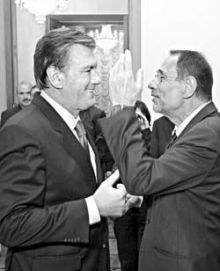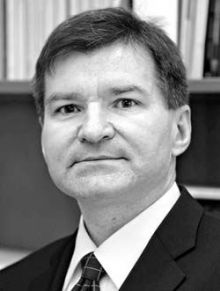The 11th EU-Ukraine summit was not a breakthrough in Kyiv’s relations with Brussels. Rather, it had more of a political significance. The participants of the summit called it a constructive and successful one. The annual meeting of high-ranking officials in the atmosphere of the impending parliamentary elections did not even represent a further step, as happened in Helsinki, where visa facilitation and readmission agreements were initialed. This time, only a joint statement about progress in the negotiation process concerning a new enhanced agreement between the EU and Ukraine, and a joint report on progress in the implementation of the EU-Ukraine Memorandum on Cooperation in the energy sphere were signed.
Nonetheless, it was very important for Ukraine, which is experiencing a political and constitutional crisis and hoping to resolve it with the help of early elections, to host this summit. Until the last moment no one was sure that the summit would take place in Kyiv and that all the EU leaders would arrive.
Therefore, the very fact that the summit took place may be considered proof that the European Union attaches great importance to Ukraine. The top representatives of the European Union gave a high assessment to the summit. Prime Minister Jose Socrates of Portugal, whose country holds the EU Presidency, underlined that the Kyiv summit was a constructive and successful one. Hosting the summit has a political significance for the EU, and Brussels has thus expressed its confidence in Ukraine and its ability to introduce constitutional clarity after the elections, said the head of the Portuguese government.
Socrates also expressed the hope that Ukraine will be successful in holding transparent and fair elections. European Commission President Jose Manuel Barroso emphasized that the summit took place at a significant moment for Ukraine, two weeks before the elections. He also expressed his belief that the elections will be held in keeping with international criteria of free and transparent elections. The EU will be able to continue its cooperation with Ukraine in order to assist Ukraine in consolidating and strengthening its progress so that it can focus its efforts on economic and political reforms, Barroso said.
“We are here as partners and friends and we believe in Ukraine’s great future,” the European Commission president stressed. Relations between Kyiv and Brussels are becoming stronger every day, and their quality is secured by a number of EU-Ukraine agreements. Barroso also said that the switch to a higher stage of relations in the Free Trade Area depends on how soon Ukraine joins the WTO. He expressed the hope that this will happen soon, adding that the EU is looking forward to the implementation of the visa facilitation agreement, signed in June this year.
Javier Solana, the EU High Representative on questions of common foreign and security policy, underlined that the holding of the Kyiv summit on schedule proves that the European Union believes in its relations with Ukraine. He also believes that Ukraine will be able to hold the elections and form a new government. At the same time Solana acknowledged that during this year’s summit both sides made strong advances on the path to preparing the EU-Ukraine Enhanced Agreement. “Today’s level of relations between Brussels and Kyiv is a much strengthened level of relations, and we appreciate Ukraine’s role,” Solana stressed.
On his part, Ukraine’s President Viktor Yushchenko thanked the European Union on behalf of the Ukrainian state and nation “for its correct and sensitive attitude at a time when Ukraine was overcoming the parliamentary crisis, when all democratic forces were involved in seeking a democratic way of resolving the parliamentary conflict.”
“We felt that deep, consistent, and open democratic position taken by the European Union towards the democratic way of managing the parliamentary crisis,” he added. The president gave his assurances that Ukraine will hold the early elections “exclusively on the basis of Ukrainian and international democratic traditions according to the legal rules.” He expressed his belief that the elections are the “basis for regulating parliament’s political instability, which Ukraine has been experiencing in the last few years.”
“This is a good basis for overcoming the constitutional instability that was caused by the deficient reform of 2004. We will withstand all these trials with the help of a political dialogue with our partners in the European Parliament,” Yushchenko added. Commenting on the course of the negotiations during the summit, the president noted that “within the framework of the negotiations the main emphasis was made on the future enhanced agreement between Ukraine and the EU.”
What is the significance of this year’s Ukraine-EU summit for our country?
COMMENTARIES
Hryhorii NEMYRIA, head of the Center of European and International Research:
“By its very definition the summit could not be a breakthrough summit. Instead, it had a rather symbolic meaning, as evidence of the European Union’s view that Ukraine is steadfast on its path to consolidating democracy and is capable of holding the elections in a transparent and fair way, thereby continuing the negotiations to establish the new, enhanced agreement. Javier Solana talked about this during his meeting with Yulia Tymoshenko. He frankly said that for a time the question was whether to hold the summit during the elections. But the fact that the summit took place and that the European leaders came to Kyiv is proof of its symbolic meaning. Secondly, I think it is important that the meeting with Tymoshenko took place during the summit, since it proves that the EU is considering the various elements of the Ukrainian political palette. I would also like to note that we discussed these questions in the BYuT’s program entitled ‘Seven points of Our Vision of Ukraine-EU Relations.’”
Arkadii MOSHES , expert at the Finnish Institute of International Relations:
“First, the very fact that the summit was held on the eve of the elections emphasizes the European Union’s confidence that, despite the elections’ results, the consistency of Ukraine’s course towards the European choice and cooperation with the European Union will remain. This is important in principle, as is the fact that the European bureaucracy did not introduce any correctives to the summit schedule and used its resources for the preparation of the summit. This is a positive sign proving that, despite all the political reversals of circumstances within the country, its normal cooperation with the European Union continues.
“Second, I think that one should pay attention to the level of the EU representatives. It was rather high. This is also evidence of the European side’s wish to emphasize the importance of its cooperation with Ukraine at the moment. I guess that all this is not accidental because the European Union is at the stage where it is really trying to prove to everybody its capacity for implementing reform and effecting a real transformation in neighboring countries without offering a membership prospect. And, paradoxically, this wish of the European Union enables it to take real steps in its frankness to solve any problems to a greater degree than before. In the past the European Union viewed all these matters from a rather egotistical position. It tried to obtain the maximum from neighboring countries, reminding them of the necessity to do their homework, without being open in response. In my opinion, the situation is changing somewhat today and the European Union is more willing to achieve results, not simply to confine itself to declarations. Therefore, one starts to consider such summits in a somewhat different way and to attach more importance to them.
“In commenting on Prime Minister Viktor Yanukovych’s statement on the eve of the summit that EU-Ukraine relations are worsening, and responding to the question whether this is the real state of affairs or the prime minister is playing some sort of game, I think that there is no worsening of relations. There several very complex problems. But I do not exclude the possibility that Yanukovych is trying to unburden himself of responsibility for potential problems that are emerging; probably in response to criticism of the Cabinet of Ministers, which has arisen, for example, from the insufficiently rapid rate of Ukraine’s accession to the WTO. The opposition should criticize the government for that, and it is doing this. Therefore, there is more advantage for him in raising this subject by himself. But in general, I think that relations with the EU are an area of great competition between Yanukovych and Yushchenko, because the one associated with the European course of Ukraine will win within the country and abroad, in the European Union, because the positive attitude in the country, including Ukraine’s east, to mending relations with Europe remains on a high level. It is advantageous to look like an integrator here, and it is bad to look like a man who has spoiled the work in this direction.”










